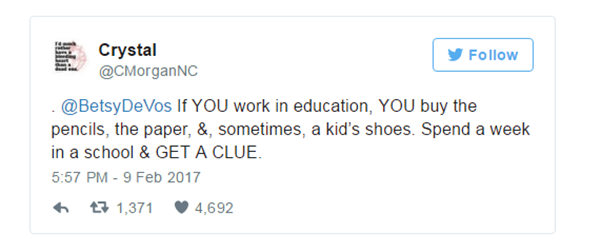Educator to Educator: A DeVos Primer
Or, how did we get here and what in the world do we do now

Josh Cramer is a civics teacher at Smithsburg High in Washington County. This year he’s teaching AP history. You read his views on charter schools and testing — here’s his primer on Education Secretary Betsy DeVos.
It’s understandable that many teachers are feeling gloomy after last week’s Senate confirmation of Betsy DeVos to serve as President Trump’s Secretary of Education. Teachers, students, parents, and other concerned citizens made phone calls and wrote letters to their Senators asking them to vote against a nominee that, in her Senate confirmation hearings, seemed woefully underprepared, underqualified, and even ignorant of some of the most basic federal legislation and debates within American education.
Clueless on IDEA and proficiency vs. growth
When questioned by Sen. Tim Kaine, DeVos wouldn’t say whether she believes in equal accountability for public and charter schools. Sen. Kaine also asked her about the federal Individuals with Disabilities Education Act (IDEA) to which she stated, “I think that is a matter that is best left up to the states.” To many, her answer seemed to suggest she doesn’t understand the relationship between the federal Department of Education with state and local boards of education.
In a line of questioning from Sen. Al Franken, DeVos didn’t seem to understand the difference between measuring for student proficiency versus growth. These red flags caused DeVos to become one of the most controversial cabinet nominees ever and this, as we know, led to Vice President Mike Pence’s unprecedented tie-breaking vote that secured her confirmation.
Pro school choice and pro vouchers
Secretary DeVos is a promoter of so-called school choice. She believes that through charter schools and voucher programs education can be improved. But she offers little credible evidence to support this. Additionally, her responses to even basic questions have caused concern for many of us.
If her knowledge of legislation and pedagogy is as limited as her Senate hearings might suggest, it is also difficult for us to determine if she will support protecting the rights of our special needs students and the rights of LGBTQ students, properly enforce federal legislation such as Title IX, and working to end the school-to-prison pipeline.
A confirmation hearing for Betsy DeVos, President-elect Donald Trump’s nominee for education secretary, begins in the…www.washingtonpost.com
No idea educators spend an average of $500 per year on supplies
On her first day on the job, Secretary DeVos took to Twitter asking: “Where do I find the pencils?” Many teachers were quick to respond with their own tweets noting that many educators have to purchase their own pencils.

I don’t need to tell you what Time Magazine reported in August 2016: teachers spend an average of $500 a year out of pocket for classroom supplies.
While our tweets were cathartic, they also highlight the very real issue that our schools need to be fully funded. DeVos’ pro-private charter school policies can only serve to further erode our public schools of the funds they need to operate properly. I hope Secretary DeVos soon discovers that public schools are the cornerstone of our communities and they are worth protecting.
Trump, DeVos, and in Maryland … Hogan
Regrettably, Gov. Hogan’s education policies appear in sync with Donald Trump and Betsy DeVos. The governor introduced plans to expand charter schools in the state and to rewrite Maryland’s current charter school law to lower standards, accountability, and transparency for charters. Maryland’s current charter school laws allow teachers to join their local teachers’ association and gives them the right to collective bargaining, a provision which Gov. Hogan is seeking to end.
President Trump and Gov. Hogan, like Scott Walker in Wisconsin, are embracing potentially catastrophic policies that seek to reduce funding to Maryland’s public schools and dismantle unions. We cannot allow them to hurt our students’ education and erode the health of Maryland schools with these misguided policies.
As educators, we have a responsibility to speak up
In light of this new political climate it is important for us to remember that over the course of the next two years, leading up to the 2018 gubernatorial election, many discussions will be had and education policy proposals debated. Many of those discussions will occur at town halls in our school auditoriums and cafeterias.
Local MSEA affiliates will host community dialogue sessions with parents, students, and members of the community to discuss our schools’ needs. The positive and real change in our schools will come from these local discussions and actions.
Secretary DeVos’ confirmation should not deter us from our mission to provide the students in our communities with the best education possible. Rather, it should make us determined to reaffirm that commitment. Here’s how we can help:
What can we do
It is also our responsibility, along with other community stakeholders, to hold public officials at all levels accountable. We should not shy away when they propose policies that will have a negative impact on our schools. Instead, we should place a special focus committing to local actions that will protect, promote, and improve our community’s public schools.
Show up to board of education meetings and make public comments. If you can’t attend, write to your board of education members.
If you aren’t already, become more active with your MSEA affiliate. Become a building representative and attend rep council meetings. There are many things you can do to help improve your schools, and you are needed now more than ever.

